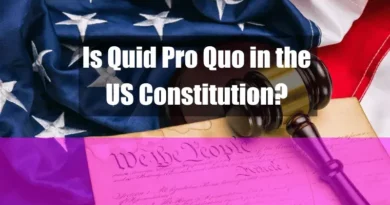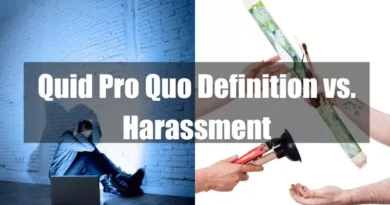Explaining No Quid Pro Quo Meaning
The phrase “no quid pro quo” means the absence of an exchange where one party provides something of value with the expectation of receiving something in return. Originating from Latin, translating to “this for that,” in modern contexts, it underscores situations where actions, services, or benefits are provided without any reciprocal arrangements or agreements. This principle is crucial in legal, political, and ethical contexts to ensure fairness, transparency, and integrity, preventing the misuse of power and influence for personal gain.
| Aspect | Description |
|---|---|
| Origin | Latin phrase “quid pro quo” meaning “this for that. |
| Modern Meaning | Absence of mutual exchange where no benefit is expected in return for a favor or action. |
| Legal Context | Ensures actions and decisions are free from reciprocal agreements, maintaining fairness and integrity. |
| Political Usage | Used to assert that actions are free from improper exchanges, particularly relevant during investigations. |
| Business Ethics | Ensures business transactions and corporate governance are conducted without expecting undue favors in return. |
| Everyday Application | Encourages genuine interactions in personal relationships and fairness in community settings. |
| Challenges | Common misconceptions and the need for clarity in its application across different contexts. |
| Importance | Upholds ethical standards, builds trust, and ensures fairness in various spheres of life. |
Let’s explore the “No Quid Pro Quo Meaning” in detail:
Introduction
The phrase “no quid pro quo” has recently gained significant attention. Its roots lie in Latin, translating to “this for that.” Modern usage implies an absence of mutual exchange where one party provides a benefit with the expectation of a return favor. This article delves into the precise meaning of “no quid pro quo,” its implications in various contexts, and the importance of understanding its usage in legal, political, and everyday scenarios.
Historical Background of Quid Pro Quo
Origin and Evolution
The concept of quid pro quo originates from Latin, a language that profoundly influenced legal and formal terminologies. Historically, it referred to an exchange or substitute. Over time, its meaning evolved to represent any reciprocal arrangement.
Modern Interpretation
In contemporary usage, quid pro quo generally refers to an arrangement where something is given or received in exchange for something else. This could be in business transactions, legal agreements, or personal favors. Adding “no” before the term fundamentally alters its meaning, indicating an absence of such an exchange.

Legal Implications
Definition in Legal Terms
In legal contexts, “no quid pro quo” is crucial. It signifies that no benefits or favors are exchanged for services or actions, ensuring fairness and legality. For example, this principle helps maintain integrity and prevent undue influence in anti-corruption laws.
Examples in Law
Instances of “no quid pro quo” appear in various legal settings. In employment law, it is often used to highlight that promotions or benefits are not granted in exchange for personal favors. Similarly, in government and politics, it ensures that public officials do not misuse their positions for personal gain.
Legal Cases and Precedents
Several legal cases highlight the importance of “no quid pro quo.” For instance, court rulings in corruption cases often hinge on whether mutual exchange was expected. Such precedents underscore the term’s significance in maintaining ethical standards.
Political Context
Usage in Politics
The phrase “no quid pro quo” frequently surfaces in political discourse. Politicians use it to assert that their actions are free from improper exchanges. This is particularly relevant during investigations or allegations of misconduct.
High-Profile Examples
High-profile cases, such as impeachment inquiries or corruption scandals, often revolve around this concept. For example, during certain political investigations, the absence of quid pro quo has been a central defense argument.
Impact on Public Perception
Public perception of “no quid pro quo” can significantly influence political outcomes. Voters expect transparency and fairness from their leaders. Hence, allegations of quid pro quo can tarnish reputations and sway public opinion.
Business and Corporate Ethics

Business Transactions
In business, “no quid pro quo” ensures ethical dealings. It signifies that business transactions are conducted without expecting undue favors in return. This principle is vital in maintaining trust and integrity in corporate relationships.
Corporate Governance
Corporate governance policies often incorporate the “no quid pro quo” principle. This helps prevent conflicts of interest and promotes fair competition. Adhering to this standard ensures that decisions are made in the company’s best interest without personal gain considerations.
Case Studies
1. Enron Scandal (2001)
- Overview: once a highly successful energy company, Enron Corporation collapsed due to widespread corporate fraud and corruption.
- Quid Pro Quo Aspect: Enron executives engaged in fraudulent accounting practices and created off-the-books entities to hide debt and inflate profits. They received significant financial compensation and bonuses in return for maintaining the company’s false image of financial health.
- Repercussions: The scandal led to Enron’s bankruptcy, numerous legal proceedings and thousands of employees and shareholders lost jobs and investments. It also resulted in stricter regulations, including the Sarbanes-Oxley Act of 2002, to prevent such misconduct.
2. Volkswagen Emissions Scandal (2015)
- Overview: Volkswagen was found to have installed software in its diesel vehicles to cheat on emissions tests.
- Quid Pro Quo Aspect: In exchange for higher sales and increased market share, Volkswagen executives and engineers engaged in deceptive practices, compromising environmental standards and public trust.
- Repercussions: The scandal led to massive fines, legal actions, and a significant hit to Volkswagen’s reputation. It also spurred tighter regulations on vehicle emissions and corporate accountability.
3. Wells Fargo Account Fraud Scandal (2016)
- Overview: Employees at Wells Fargo created millions of unauthorized bank and credit card accounts to meet sales targets.
- Quid Pro Quo Aspect: Employees were pressured to meet unrealistic sales goals and were incentivized with bonuses and promotions, even if it meant engaging in unethical practices.
- Repercussions: The scandal resulted in fines, lawsuits, and a significant loss of customer trust. The company had to overhaul its sales practices and leadership and faced ongoing regulatory scrutiny.
4. Bribery in the FIFA Scandal (2015)
- Overview: High-ranking FIFA officials were indicted for racketeering, wire fraud, and money laundering.
- Quid Pro Quo Aspect: Officials accepted bribes and kickbacks in exchange for awarding lucrative media and marketing rights and hosting rights for major football tournaments.
- Repercussions: The scandal led to multiple arrests, significant reforms within FIFA, and a broader investigation into corruption in international sports organizations.
These case studies underscore the critical importance of adhering to the “no quid pro quo” principle in maintaining ethical standards and ensuring long-term trust and integrity in business practices.
Everyday Scenarios

Personal Relationships
In personal relationships, “no quid pro quo” underscores the value of genuine interactions. It implies that favors and support are offered without expecting anything in return, fostering trust and goodwill.
Social and Community Settings
In community settings, this principle promotes fairness and equality. It ensures that assistance and resources are provided based on need rather than reciprocal arrangements. This fosters a sense of community and mutual support.
Ethical Considerations
Understanding and applying “no quid pro quo” in everyday life encourages ethical behavior. It emphasizes the importance of offering help and support unconditionally, which can enhance personal and social relationships.
Challenges and Misunderstandings
Common Misconceptions
Misunderstandings about “no quid pro quo” can arise due to its nuanced nature. Some might interpret it as an absence of any exchange, while others may see it as an ideal rather than a practical standard.
Clarifying the Concept
Clarifying the concept involves understanding its application in different contexts. For instance, while mutual exchanges are common in business, the principle ensures that such exchanges are transparent and ethical.
Addressing Challenges
Addressing challenges related to this concept requires a clear understanding of ethical standards and legal definitions. This ensures that actions and decisions align with the principles of fairness and integrity.
Importance in Maintaining Integrity

Ethical Standards
Maintaining ethical standards involves adhering to the principle of “no quid pro quo.” This ensures that actions and decisions are based on merit and fairness rather than reciprocal arrangements.
Building Trust
Building trust in various personal, professional, or political relationships hinges on the absence of quid pro quo. It assures stakeholders that interactions are genuine and free from undue influence.
Ensuring Fairness
Ensuring fairness is a core aspect of this principle. It promotes equality and prevents the misuse of power and influence, which is crucial in maintaining social and organizational harmony.
Conclusion to “No Quid Pro Quo Meaning”
The meaning of “no quid pro quo” extends beyond its literal translation, encompassing principles of fairness, integrity, and ethical behavior. Understanding and applying this concept is essential in legal, political, business, and everyday contexts. Promoting actions free from improper exchanges helps build trust, ensure fairness, and uphold ethical standards across various spheres of life.
Incorporating the quo” principle in principle, Whether in personal relationships or professional settings, adhering to this standard enhances trust and promotes a sense of fairness and equality.
FAQ
How does “no quid pro quo” relate to conflicts of interest?
No quid pro quo” helps prevent conflicts of interest by ensuring that decisions and actions are based on merit and fairness rather than reciprocal agreements. This principle promotes transparency and integrity, especially in professional and political settings where personal gain can otherwise influence decision-making.
Can “no quid pro quo” apply in educational settings?
Yes, “no quid pro quo” can apply in educational settings to ensure fairness and equality. For instance, grades, recommendations, or admissions should not be influenced by personal favors or exchanges, maintaining the integrity of academic evaluations and processes.
How is “no quid pro quo” enforced in workplace policies?
In workplaces, “no quid pro quo” is enforced through strict policies and regulations prohibiting employees and managers from engaging in exchanges that could result in favoritism or unfair advantages. Training programs and clear reporting mechanisms are also in place to uphold this principle and promptly address violations.
What are the consequences of violating “no quid pro quo” in public service?
Violating “no quid pro quo” in public service can lead to severe consequences, including legal action, loss of public trust, and damage to reputations. Public officials found engaging in quid pro quo arrangements may face charges of corruption, removal from office, and other disciplinary actions, highlighting the importance of maintaining ethical standards in governance.









